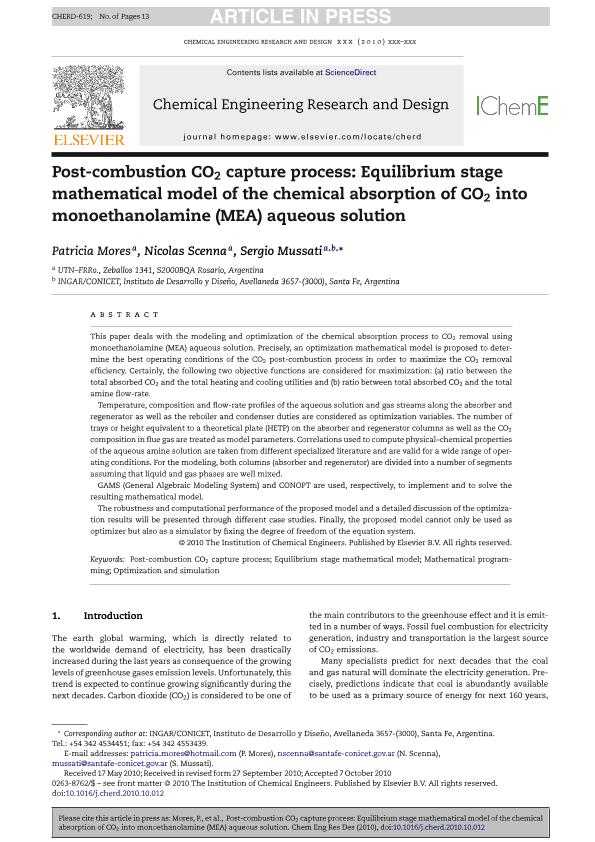Mostrar el registro sencillo del ítem
dc.contributor.author
Mores, Patricia Liliana

dc.contributor.author
Scenna, Nicolas Jose

dc.contributor.author
Mussati, Sergio Fabian

dc.date.available
2019-02-15T16:09:59Z
dc.date.issued
2011-09
dc.identifier.citation
Mores, Patricia Liliana; Scenna, Nicolas Jose; Mussati, Sergio Fabian; Post-combustion CO2 capture process: Equilibrium stage mathematical model of the chemical absorption of CO2 into monoethanolamine (MEA) aqueous solution; Institution of Chemical Engineers; Chemical Engineering Research & Design; 89; 9; 9-2011; 1587-1599
dc.identifier.issn
0263-8762
dc.identifier.uri
http://hdl.handle.net/11336/70271
dc.description.abstract
This paper deals with the modeling and optimization of the chemical absorption process to CO2 removal using Monoethanolamine (MEA) aqueous solution. Precisely, an optimization mathematical model is proposed to determine the best operating conditions of the CO2 post-combustion process in order to maximize the CO2 removal efficiency. Certainly, two objective functions are considered for optimization. Temperature, composition and flow-rate profiles of the aqueous solution and gas streams along the absorber and regenerator as well as the reboiler and condenser duties are considered as optimization variables. The number of trays or height equivalent to a theoretical plate (HETP) on the absorber and regenerator columns as well as the CO2 composition in flue gas are treated as model parameters. Correlations used to compute physical-chemical properties of the aqueous amine solution are taken from different specialized literature and are valid for a wide range of operating conditions. For the modeling, both columns (absorber and regenerator) are divided into a number of segments assuming that liquid and gas phases are well mixed. GAMS (General Algebraic Modeling System) and CONOPT are used, respectively, to implement and to solve the resulting mathematical model. The robustness and computational performance of the proposed model and a detailed discussion of the optimization results will be presented through different case studies. Finally, the proposed model can not only be used as optimizer but also as a simulator by fixing the degree of freedom of the equation system.
dc.format
application/pdf
dc.language.iso
eng
dc.publisher
Institution of Chemical Engineers

dc.rights
info:eu-repo/semantics/openAccess
dc.rights.uri
https://creativecommons.org/licenses/by-nc-sa/2.5/ar/
dc.subject
Post-Combustion Co2 Capture Process
dc.subject
Equilibrium Stage Mathematical Model
dc.subject
Mathematical Programming
dc.subject
Optimization And Simulation
dc.subject.classification
Otras Ingeniería Química

dc.subject.classification
Ingeniería Química

dc.subject.classification
INGENIERÍAS Y TECNOLOGÍAS

dc.title
Post-combustion CO2 capture process: Equilibrium stage mathematical model of the chemical absorption of CO2 into monoethanolamine (MEA) aqueous solution
dc.type
info:eu-repo/semantics/article
dc.type
info:ar-repo/semantics/artículo
dc.type
info:eu-repo/semantics/publishedVersion
dc.date.updated
2019-02-12T17:23:50Z
dc.journal.volume
89
dc.journal.number
9
dc.journal.pagination
1587-1599
dc.journal.pais
Reino Unido

dc.description.fil
Fil: Mores, Patricia Liliana. Universidad Tecnológica Nacional. Regional Rosario. Centro de Aplicaciones Informáticas y Modelado en Ingeniería; Argentina. Consejo Nacional de Investigaciones Científicas y Técnicas. Centro Científico Tecnológico Conicet - Santa Fe; Argentina
dc.description.fil
Fil: Scenna, Nicolas Jose. Consejo Nacional de Investigaciones Científicas y Técnicas. Centro Científico Tecnológico Conicet - Santa Fe. Instituto de Desarrollo y Diseño. Universidad Tecnológica Nacional. Facultad Regional Santa Fe. Instituto de Desarrollo y Diseño; Argentina. Consejo Nacional de Investigaciones Científicas y Técnicas. Centro Científico Tecnológico Conicet - Santa Fe; Argentina
dc.description.fil
Fil: Mussati, Sergio Fabian. Consejo Nacional de Investigaciones Científicas y Técnicas. Centro Científico Tecnológico Conicet - Santa Fe. Instituto de Desarrollo y Diseño. Universidad Tecnológica Nacional. Facultad Regional Santa Fe. Instituto de Desarrollo y Diseño; Argentina
dc.journal.title
Chemical Engineering Research & Design

dc.relation.alternativeid
info:eu-repo/semantics/altIdentifier/doi/http://dx.doi.org/10.1016/j.cherd.2010.10.012
Archivos asociados
